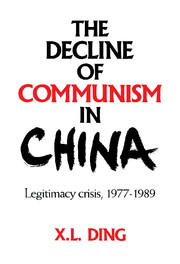Appendix: Notes on methods and methodology
Published online by Cambridge University Press: 17 September 2009
Summary
In this work I examine the interaction between the PRC ruling elite and the counterelite by focusing on a series of events that occurred during the post-Mao era. The standard for the selection of events is that they constituted the major issues in the conflict between the two elite groups concerning the direction of reform; they both received great attention from and exerted a major impact on the politically concerned Chinese population, thereby exercising a noticeable influence on the courses of political development.
Some of the subject matter of this study is highly publicized and some is politically sensitive. Because of this, some needed material was easily obtainable (e.g., material about the regime's political appeals) while other material was not (e.g., material about the reaction to the appeals from social segments that had less access to means of expression). The material used in this study is of varying quality and can be classified as follows.
1. Information I accumulated when in China. Sociological literature usually divides information of this sort into two categories, “background knowledge,” which the participant obtained as the result of living a long time in the society, and “formal knowledge,” which he collected as the result of his purposeful research. With regard to the former, my life experience in China provides the background.
- Type
- Chapter
- Information
- The Decline of Communism in ChinaLegitimacy Crisis, 1977–1989, pp. 205 - 213Publisher: Cambridge University PressPrint publication year: 1994



